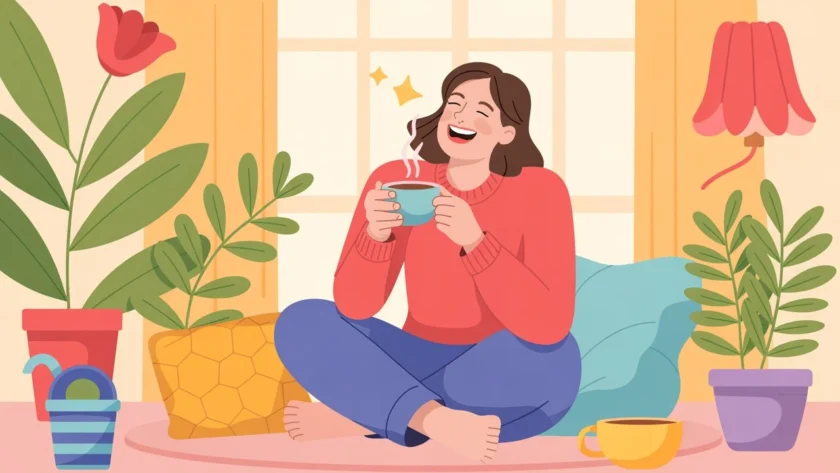I’ll never forget the moment during one of my worst panic attacks when Bailey, my rescue dog, sneezed so hard he fell off the couch. There I was, heart racing, convinced I was dying, and this goofy dog just somersaulted onto the floor and looked at me like “Did you see that?” And despite everything my anxious brain was screaming at me, I laughed. Just for a second, but I laughed.
That tiny moment changed something for me. It didn’t cure my anxiety—I wish it were that simple—but it cracked open a door I didn’t know existed. Here’s what I’ve come to understand over years of wrestling with anxiety: laughter isn’t just some feel-good distraction. It’s actually one of the most powerful tools God gave us for managing the physical and emotional weight of worry.
If you’re reading this while your chest feels tight and your mind won’t stop spinning worst-case scenarios, I know suggesting “just laugh more” might sound about as helpful as “just don’t worry.” But stick with me here. What I’m talking about isn’t forced positivity or pretending everything’s fine. It’s about understanding how God designed our bodies to respond to genuine joy—and how we can tap into that design, even on the hardest days.
Why Laughter Actually Works (It’s Not Just in Your Head)
When I first started learning about anxiety recovery, I was skeptical of anything that sounded too simple. Laughter for anxiety relief? Sure, right after I try positive thinking and essential oils. But then I learned what actually happens in your body when you laugh, and suddenly it made sense why that moment with Bailey had cut through my panic.
When you laugh—really laugh, not just a polite chuckle—your body undergoes some remarkable changes. Your brain releases endorphins, those natural feel-good chemicals that act like God’s built-in pain relievers. Your heart rate and blood pressure initially spike (which is why you might feel breathless when something’s really funny), but then they drop below your baseline. It’s like hitting a physiological reset button.
What fascinated me most was learning about cortisol, that stress hormone that anxiety keeps pumping through our systems like it’s going out of style. Laughter actually reduces cortisol levels. I’ve spent so many nights lying awake, my body flooded with stress hormones, trying to will myself calm. Turns out, a good laugh does what willpower alone never could.
There’s something else that happens too, something I’ve experienced but didn’t understand until recently. When you’re genuinely laughing, you can’t simultaneously be in full fight-or-flight mode. Your body literally can’t maintain peak anxiety while you’re cracking up. It’s not that laughter makes anxiety disappear—mine certainly hasn’t vanished—but it interrupts the anxiety cycle just long enough to give you some breathing room.
Psalm 126:2 says, “Our mouths were filled with laughter, our tongues with songs of joy.” I used to think that was just poetic language about being happy. Now I wonder if God was pointing to something deeper—that laughter is actually part of how we’re wired to experience relief and restoration.
The Anxiety-Laughter Connection Nobody Talks About
Here’s what I wish someone had told me years ago: anxiety and humor have a complicated relationship, and understanding it changes everything.
When anxiety takes over, it’s like your brain gets stuck in threat-detection mode. Everything becomes serious, urgent, potentially dangerous. I remember periods where I couldn’t enjoy a comedy show because my mind kept wandering to my worries. A friend would tell a joke and I’d force a smile while internally running through my anxiety checklist. Sound familiar?
But here’s the paradox—and I mean this is a genuine game-changer—the times when laughter feels most impossible are often when we need it most. Not because we should be happy when we’re struggling, but because laughter briefly loosens anxiety’s grip on our nervous system.
I’ve learned that anxiety thrives on taking itself seriously. It wants you to believe that everything is an emergency, that letting your guard down for even a moment is dangerous. Humor—genuine, belly-laugh humor—challenges that narrative. It says, “Actually, maybe not everything has to be treated like a crisis right this second.”
This doesn’t mean laughing away legitimate concerns or using humor to avoid dealing with real issues. I’ve tried that too, and it’s just another form of anxiety avoidance. What I’m talking about is using humor as a tool to regulate your nervous system while you’re doing the hard work of addressing your anxiety.
Practical Ways to Invite More Laughter Into Your Healing Journey
Let me be honest with you—when I was in the thick of my anxiety struggles, someone telling me to “watch funny videos” would have felt dismissive. So I’m not going to give you a superficial list of “just do these things.” Instead, I want to share what’s actually worked for me and the people I’ve worked with as an anxiety coach.
Start with what naturally makes you smile. Not what should be funny or what makes other people laugh, but what genuinely tickles your sense of humor. For me, it’s dry British comedies and those videos of animals doing ridiculous things. For you, it might be stand-up comedy, sitcom reruns, or funny podcasts. There’s no wrong answer here. God gave each of us a unique sense of humor—lean into yours.
I keep a folder on my phone called “Emergency Laughter.” It’s full of memes, video clips, and screenshots of funny text conversations. When I feel anxiety ramping up, especially late at night when it loves to attack, I pull out that folder. Does it solve my problems? No. Does it interrupt the anxiety spiral and give me a moment to breathe? Absolutely.
Connect with people who make you laugh. This one’s tricky because anxiety often makes us want to isolate. I get it. When you’re anxious, social interaction can feel exhausting. But I’ve found that having even one friend who can make me laugh—really laugh, the kind that makes your stomach hurt—is invaluable.
My friend Sarah has this gift of finding humor in everyday absurdities without being mean-spirited about it. When I’m spiraling, she doesn’t tell me to calm down or that everything’s fine. She just shares something funny, and suddenly my brain has permission to focus on something besides worst-case scenarios. If you don’t have someone like that in your life, ask God to bring you people who can lighten your load. Proverbs 17:22 reminds us that “A cheerful heart is good medicine,” and I believe that includes the cheerful hearts of friends who can make us laugh.
Laugh at anxiety itself—carefully. Now, this takes some practice and timing, but it’s been surprisingly powerful for me. There are moments, when I’m not in the acute phase of panic, where I can look at some of my anxious thoughts and recognize how absurd they are.
Like the time I was convinced a headache meant I had a brain tumor, so I googled symptoms for three hours, which gave me more anxiety, which made my head hurt worse, which convinced me I was definitely dying. Looking back, I can laugh at that anxiety spiral—not because my fear wasn’t real in the moment, but because I can now see the pattern and recognize when I’m doing it again.
I’ve started naming my anxiety “Herbert.” When Herbert tells me that everyone definitely hates me because I said something awkward at church, I can sometimes respond with, “Thanks for that input, Herbert, but you’re being dramatic again.” There’s something disarming about using humor to create distance between yourself and your anxious thoughts.
Creating a Laughter Practice (Yes, Really)
I know “laughter practice” sounds forced, maybe even fake. I thought so too. But what I’ve discovered is that intentionally making space for humor in your daily routine isn’t about faking happiness—it’s about giving your nervous system regular opportunities to downshift.
Every morning, while I’m drinking my coffee and spending time in prayer, I also scroll through a couple of my favorite humor accounts on social media. It’s become part of my spiritual practice, actually. I thank God for the gift of laughter, ask Him to help me not take myself too seriously today, and let myself enjoy something funny before the day’s stresses pile on.
This isn’t instead of prayer or Bible reading—it’s alongside it. I’ve found that starting my day with both spiritual grounding and a light heart sets a completely different tone than starting it by immediately checking my news feed or diving into my worry list.
Laughter yoga is a real thing, and while it sounds ridiculous (which is kind of the point), the research behind it is solid. The practice involves intentional laughter exercises combined with breathing techniques. Your body doesn’t actually know the difference between “fake” laughter and genuine laughter—it responds the same way either way.
I tried it once in a group setting and felt completely ridiculous, which made me laugh for real, which was exactly the point. You don’t have to join a class or anything formal. Sometimes when I’m alone and feeling anxious, I just start fake laughing, and within thirty seconds, the absurdity of fake laughing by myself makes me genuinely laugh. Try it. I dare you.
When Laughter Feels Impossible (Because Sometimes It Does)
Let me pause here and acknowledge something important: there are seasons of anxiety where laughter feels not just difficult but almost impossible. I’ve been there. I’ve had weeks where even the funniest thing couldn’t crack through the darkness.
If you’re in that place right now, please hear me—this isn’t about forcing yourself to be happy or pretending you’re not struggling. There’s no condemnation here. Jesus wept, after all. He didn’t laugh His way through Gethsemane. There are times for tears, times for lament, times to sit with trusted friends or counselors and process real pain.
What I’m offering is a tool for your toolkit, not a magic cure or a should-do that adds to your burden. Some days, the best you can do is survive, and that’s enough. God doesn’t love you more on days when you laugh than on days when you cry. His love isn’t contingent on your ability to find humor in your circumstances.
But I also want to gently suggest that if laughter has felt completely out of reach for an extended period, it might be worth talking to a counselor or doctor. Sometimes, when depression teams up with anxiety, it steals our ability to experience joy or humor. That’s a medical issue, not a spiritual failing, and there’s help available.
I spent too long thinking I just needed to pray harder or have more faith. It wasn’t until I combined therapy, occasionally medication, and spiritual practices that I began to experience moments of genuine lightness again. Faith and professional help work beautifully together—they’re not competing approaches but complementary ones.
The Spiritual Side of Sacred Laughter
There’s something I’ve been learning about God that’s changed how I view laughter in the context of anxiety: I don’t think God is nearly as serious and stern as we often make Him out to be.
The God who created platypuses and penguins and pugs has a sense of humor. The God who told Sarah she’d have a baby in her old age and she literally laughed? He named that baby Isaac, which means “laughter.” That’s not a cosmic coincidence—that’s God saying, “Yes, laughter matters.”
I’ve started to see laughter as a form of worship, a way of declaring that anxiety doesn’t get the final word. When I laugh despite my worries, I’m proclaiming that there’s still joy to be found, still lightness available, still evidence that God is good even when my brain is lying to me about danger.
Ecclesiastes 3:4 reminds us there’s “a time to weep and a time to laugh.” Both are holy. Both are necessary. Anxiety wants to convince us that we can never let our guard down, that we must remain vigilant and serious at all times. But God invites us into something different—a life where we can acknowledge real struggles while also making space for real joy.
When I’m having a particularly anxious day, sometimes I pray, “God, help me find one thing to laugh about today. Just one.” It’s become one of my favorite prayers because it acknowledges my current struggle while also expressing faith that there’s still goodness to be found.
Moving Forward with a Lighter Heart
Here’s what I want you to take away from all of this: laughter for anxiety relief isn’t about denying your struggles or slapping a smile on genuine pain. It’s about understanding that God built our bodies with natural anxiety-relief mechanisms, and humor is one of them.
You don’t have to become a different person or develop a comedian’s sense of humor. You just need to give yourself permission to experience lightness when it shows up, to seek out moments of genuine joy even in the middle of hard seasons, and to trust that laughter isn’t frivolous or irresponsible—it’s part of how we’re designed to heal.
Start small. Maybe today, that means watching one funny video. Maybe it means texting a friend who always makes you smile. Maybe it means noticing one absurd thing and letting yourself find the humor in it. These tiny moments of laughter add up, creating little pockets of relief in the anxiety that might feel overwhelming right now.
And remember, you’re not alone in this journey. God is with you in your anxiety, yes, but He’s also with you in your laughter. He’s not waiting for you to get it all together before He delights in you. He delights in you right now, anxious thoughts and all.
So let yourself laugh when you can. Let yourself smile. Let yourself experience those brief moments when your nervous system gets to rest and your heart gets to feel light. It’s not the whole answer to anxiety—I’m still working on mine too—but it’s a beautiful part of the healing journey.
And who knows? Maybe God will use something as simple as a dog falling off a couch to remind you that there’s still hope, still joy, still reasons to laugh even when anxiety tries to convince you otherwise.
Be gentle with yourself. Take it one moment at a time. And keep that emergency laughter folder handy—trust me on this one.Retry



